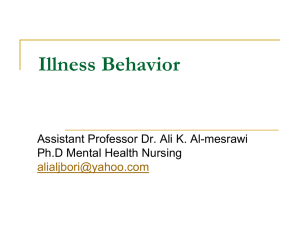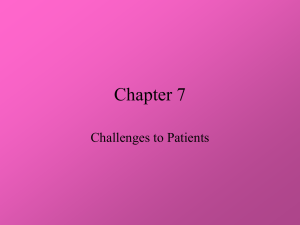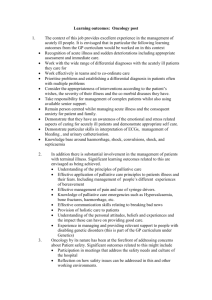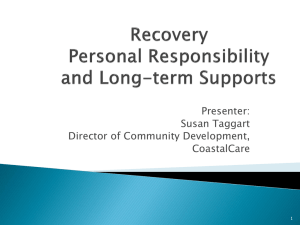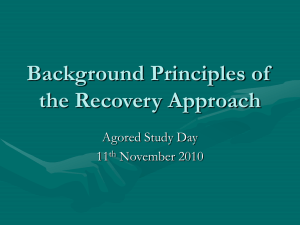Reserve Extenuating Circumstances Form
advertisement
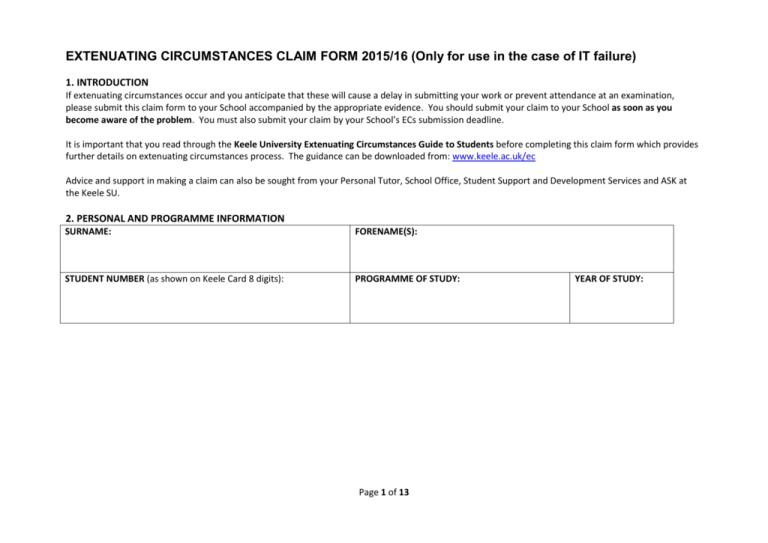
EXTENUATING CIRCUMSTANCES CLAIM FORM 2015/16 (Only for use in the case of IT failure) 1. INTRODUCTION If extenuating circumstances occur and you anticipate that these will cause a delay in submitting your work or prevent attendance at an examination, please submit this claim form to your School accompanied by the appropriate evidence. You should submit your claim to your School as soon as you become aware of the problem. You must also submit your claim by your School’s ECs submission deadline. It is important that you read through the Keele University Extenuating Circumstances Guide to Students before completing this claim form which provides further details on extenuating circumstances process. The guidance can be downloaded from: www.keele.ac.uk/ec Advice and support in making a claim can also be sought from your Personal Tutor, School Office, Student Support and Development Services and ASK at the Keele SU. 2. PERSONAL AND PROGRAMME INFORMATION SURNAME: FORENAME(S): STUDENT NUMBER (as shown on Keele Card 8 digits): PROGRAMME OF STUDY: Page 1 of 13 YEAR OF STUDY: 3. NATURE OF CLAIM Please the relevant box of the type circumstances that you believe are affecting your academic performance or are preventing you from completing the assessment at the appointed time. You should also indicate the time period during which you have been affected by these circumstances. Your claim must be supported by relevant independent evidence, including any work completed to date if you are asking for an extension. See Annexes A and B for guidance on extenuating circumstances criteria and evidence requirements. Type of Circumstances Dates affected Acute illness or injury Extended illness or injury (more than 5 working days) Acute Illness of another person Bereavement Significant domestic and/or personal problems Court Attendance Unforeseen Work Commitment (Part-Time/Distance Learning/PG students only) Unforeseen representation of County or Country at Sport Active Exercise of Citizenship Unforeseen Major Transport Difficulties Victim of Criminal Activity Other (Please specify briefly ) Page 2 of 13 List the evidence you are submitting in support of your claim. If it is not attached please indicate when it will be available. See Annex B for guidance on evidence types. 4. STUDENT STATEMENT Then in the box below please tell us in your own words the details of the circumstances. You should state clearly the details of the circumstances and how they will prevent you from undertaking an assessment or have a significant negative effect on your performance. If you are not sure what to include please seek advice from the University’s student support services, ASK or an appropriate person in your School. Page 3 of 13 5. MODULES AFFECTED Tell us below about the modules that are affected, and indicate what you are requesting for each assessment using the appropriate code(s) listed below. 1 2 3 Further assessment opportunity (to be considered as the same attempt) (Note that this will be at the next formal assessment/reassessment opportunity) Extension Deferred placement For completion by student Module Code* Module Title Examination or Written Work For completion by School Date of Exam or Submission date Code 1–3 Extension in principle date Action recommended by the Board of Examiners *You should be able to find the module code on your module documentation, or on the KLE. 6. STUDENT DECLARATION I declare that the information that I have given on this form and in the accompanying documents is true. I understand that submitting false information will be regarded as an attempt to gain an unfair advantage in your studies and will be investigated under the terms of Regulation 8.12 by the Academic Misconduct Panel. NAME: SIGNATURE: DATE: Page 4 of 13 RECIEPT OF EXTENUATING CIRCUMSTANCES CLAIM - FOR COMPLETION BY THE SCHOOL Please complete detach and return to the student as proof of receipt (delete as applicable) I acknowledge receipt of the student’s extenuating circumstances form and evidence The student has submitted their claim form and will submit their evidence within 5 working days NAME POSITION STUDENT NUMBER OF CLAIMANT Page 5 of 13 DATE Page intentionally left blank Page 6 of 13 ANNEX A –EXTENUATING CIRCUMSTANCES CRITERIA AND APPROPRIATE EVIDENCE (Please refer to Annex B for more detail on appropriate evidence) Examples of Appropriate Evidence (see Annex B) A – Student Statement Criteria 1 Acute illness or injury Sudden, acute illness or personal injury which will prevent the student from completing an assessment at the specified time, or will have a significant negative effect on the performance of student on the date an assessment is due to be undertaken AND/OR B – Medical Evidence OR Additional Notes Where illness is for less than a period of 5 days, students are permitted to self-certify their illness, provided that the dates and times of illness are clearly expressed in their student statement. Where there is reason to doubt the veracity of self-certification (eg. repeated selfcertification is evident) the School ECs Panel may ask the student to provide further medical evidence. Sudden, acute exacerbation of long term or chronic condition which is likely to effect the student to a greater extent than normally accustomed and prevent the student from completing an assessment at the specified time or will have a significant negative effect on the performance of student on the date an assessment is due to be undertaken If illness occurs during an examination the invigilator will complete an incident report form which will be sent to the relevant School. The invigilator will also advise the student to contact the school for advice about making an ECs claim. 2 Extended illness or injury (more than 5 working days) A – Student Statement Extended illness or personal injury likely to prevent the student from completing an assessment in the time they might reasonably be expected to complete the production of coursework, or will have a significant effect on the performance of the student during one or more assessment Page 7 of 13 AND B – Medical Evidence Examples of Appropriate Evidence (see Annex B) A - Student Statement Criteria 3 Illness of another person Sudden, acute illness, injury or exacerbation of long term/chronic condition affecting another person, that requires the close and frequent attention of the student, and will prevent the student from completing an assessment or attending an assessment at the specified time AND B - Medical Evidence OR 4 D - Corroboration from a professional person A Student Statement Bereavement Death of close member of family, partner, or close friend close to the date the assessment is due to be undertaken or submitted, or during the period the student might reasonably be expected to give time to the production of coursework, which will prevent the student from completing an assessment at the specified time, or will have a significant negative effect on the performance of student on the date the assessment is due to be undertaken AND C Copy of Death Certificate or funeral letter OR D Corroboration from a professional person A Student Statement 5 Significant Domestic and/or Personal Problems 6 Significant problems in the student’s domestic or personal circumstances of a nature likely which will prevent the student from completing an assessment at the specified time, or will have a significant negative effect on the performance of student on the date an assessment is due to be undertaken, or during the period the student might reasonably be expected to give time to the production of coursework. Court Attendance Jury Service, or attendance at Court or a Tribunal as a witness, defendant or plaintiff, on the date an assessment is due to be undertaken or submitted, or during the period the student might reasonably be expected to give time to the production of coursework. Page 8 of 13 AND D Corroboration from a professional person A Student Statement AND E Official correspondence from the Court or Tribunal Authority Additional Notes Examples of Appropriate Evidence (see Annex B) A Student Statement Criteria 7 Unforeseen Work Commitment 8 Student must be studying part-time, by distance learning or be a postgraduate student who has completed the taught element of the course and is writing up their dissertation. There must be unanticipated, non- negotiable work commitment which will prevent the student from attending on the date the assessment is due to be undertaken, or will have a significant negative effect on the performance of the student during the period they might reasonably be expected to give time to the production of coursework. Unforeseen representation of County or Country at Sport Student selected at short-notice to represent country or county at a sporting event which requires absence from the University on the date the assessment is due to be undertaken or during the period the student might reasonably be expected to give time to the production of coursework (usually of more than 5 working days). 10 Active Exercise of Citizenship An unanticipated and/or non-negotiable commitment to duties associated with an elected office, membership of a voluntary organisation, or service with Reserve Forces, as a result of which, either the student will be unable to attend on the date the assessment is due to be undertaken, or the student is unable to give time to the production of an assessment during the relevant period. 11 Transport Difficulties Major difficulties with public or personal transport which prevented attendance on the date the assessment was due to be undertaken or submitted, that could not reasonably have been anticipated, and did now allow sufficient time for alternative arrangements (eg calling a taxi) reasonably to be made. 13 Victim of Criminal Activity The student was the victim of a crime which will prevent the student from completing an assessment by the specified time, or will have a significant negative effect on performance in that assessment or during the period a student might reasonably be expected to give time to production of an assessment. Page 9 of 13 Additional Notes AND F Letter of corroboration (from employer) Letter must explain why the commitment was non-negotiable and/or unanticipated A Student Statement If the commitment is known of in advance, students should instead discuss with the relevant School whether special arrangements can be made for the relevant assessment. AND G Letter from the appropriate sporting association A Student Statement AND F Letter of corroboration (from relevant organisation) Letter must explain why the commitment was non-negotiable and/or unanticipated A Student Statement Student Statement must explain the nature of the difficulty, why the difficulty could not reasonably have been anticipated and why alternative arrangements (eg calling a taxi) could not reasonably have been made. AND I Appropriate Evidence to validate the claim A Student Statement AND H Corroboration from Police Force or other investigating authority Crime must have been reported to the appropriate authority for investigation. Examples of Appropriate Evidence (see Annex B) A Student Statement Criteria 14 Other Exceptional extenuating circumstances that do not fall under any of the criteria defined above. AND I Appropriate Evidence to validate the claim Additional Notes Further specific evidence is likely to be requested from the student in such cases to determine whether the claim can be valid. The School Discipline Panel may refer such cases to the Sub-Committee on Examination Absences and Course Work Extension (SCEACE). NB: Please note that accepting an extenuating circumstances claim is at the discretion of the School. The following list gives examples of other circumstances that are not considered as a valid extenuating circumstance: Mistaking the date/time of an examination or coursework deadline General pressure of academic work e.g. a number of assignments with similar deadlines, as you are expected to plan your work schedule Employment commitments (though there are some exceptions – see above) Alarm failure on the morning of the examination Holidays Family events Personal computer/other IT device failure as you should have taken adequate precautionary measures e.g. backups Not leaving adequate time to access IT equipment/printing facilities and then finding that they are not available, unless there has been a documented systems failure Non compatibility of your IT equipment with University IT equipment, as it is expected that you should have planned and checked that it was possible to transfer files from your computer to the University systems well before the assessment deadlines Religious observance – as such issues are not unforeseen and students should be discussing any issues with their School(s) in advance Page 10 of 13 ANNEX B TYPES OF EVIDENCE TYPE A EVIDENCE The student’s statement of their case NOTES A section for your statement is provided on the claim form. You should state clearly the details of the circumstances and how they will prevent you from undertaking an assessment or have a significant negative effect on your performance. You will only be permitted to self-certify your illness where illness is for less than a period of 5 days. You should state clearly that you are self-certifying your illness and provide the exact dates and times of illness in your student statement. You should also consider the consequences of self-certifying your absence, as this will likely mean you will have a greater number of assessments to take at the next assessment period. B Medical Evidence If you are not sure what to include or whether you should self-certify your absence, please seek advice from your Personal Tutor, the University’s student support services, ASK or an appropriate person in your School. You should get documentation from a medical practitioner who is registered with a recognised professional body such as: The General Medical Council, Health Professions Council, British This includes: Medical Certificate signed by the medical practitioner whilst the illness or incident was affecting the student Other medical evidence such as copies of prescriptions, certificates of attendance at surgery or hospital A doctor’s written opinion given after receiving the student’s permission to release information Association for Counselling and Physiotherapy C Copy of Death Certificate or Funeral Director’s letter D Letter of corroboration from a professional person E Official correspondence from the Court or Tribunal Authority Letter of corroboration from employer/organisation Remember to keep original copies and be prepared to produce the original promptly if needed by the School With whom the student has a professional, not a personal, relationship eg. counsellor, member of University staff, exam invigilator. Remember to keep original copies and be prepared to produce the original promptly if needed by the School Must explain why the commitment was non-negotiable and/or unanticipated signed by the student’s line manager or supervisor, or by an appropriately senior and authorised representative of the relevant organisation. F Please see Appendix 1 for information on the nine health professional regulatory bodies in the UK. For extended illness or injury your medical evidence should include the following information – you might find it helpful to show this list to the person who is providing your documentation so that they know what to include: Brief statement on your health circumstances or incident affecting you Dates and outcomes of any consultations Dates of the affected period – which should cover the dates of the affected assessments Information on when you are likely to recover if applicable If difficulties are chronic or likely to be persistent, information on the likelihood of future serious episodes Remember to keep original copies and be prepared to produce the original promptly if needed by the School Page 11 of 13 TYPE G H I EVIDENCE Letter from the appropriate sporting association or authority Corroboration of the reported crime from the Police or other investigating authority Appropriate Evidence to validate the claim NOTES Must explain why the absence is required at short notice Remember to keep original copies and be prepared to produce the original promptly if needed by the School Further specific evidence is likely to be requested from the student in such cases to determine whether the claim can be valid. The School Discipline Panel may refer such cases to the Sub-Committee on Examination Absences and Course Work Extension. Page 12 of 13 APPENDIX ONE HEALTH PROFESSIONAL REGULATORY BODIES IN UK There are nine health professional regulatory bodies in the UK set up to protect and promote the safety of the public. They do this by: setting the standards of behaviour, competence and education that health professionals must meet; dealing with concerns from patients, the public and others about health professionals who are unfit to practise because of poor health, misconduct or poor performance; keeping registers of health professionals who are fit to practise in the UK; the regulators can remove professionals from their registers and prevent them from practising if they consider this to be in the best interests of the public. These bodies are overseen by the Professional Standards Authority. The nine health professional regulatory bodies are: Arts therapists General Chiropractic Council (GCC) Biomedical scientists Chiropractors Chiropodists/podiatrists General Dental Council (GDC) Clinical scientists Dentists Dietitians Dental nurses Hearing aid dispensers Dental technicians Occupational therapists Dental hygienists Operating department practitioners Dental therapists Orthoptists Clinical dental technicians Paramedics Orthodontic therapists Physiotherapists General Medical Council (GMC) Practitioner psychologists Doctors Prosthetists/orthotists General Optical Council (GOC) Radiographers Optometrists Speech and language therapists Dispensing opticians Nursing and Midwifery Council (NMC) Student opticians Nurses Optical businesses Midwives General Osteopathic Council (GOsC) Pharmaceutical Society of Northern Ireland Osteopaths (PSNI) General Pharmaceutical Council (GPhC) Pharmacist Pharmacists Health Professions Council (HPC) Please go to the Professional Standards Authority website for further information: http://www.professionalstandards.org.uk/regulators/statutory-regulators-directory Counselling and Psychotherapy Counsellors or psychotherapists should normally be registered with the British Association for Counselling and Psychotherapy www.bacp.co.uk and/or the Health Professions Council http://www.hpc-uk.org/ Page 13 of 13




